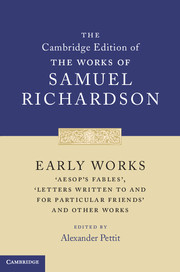Book contents
- Frontmatter
- Dedication
- Contents
- General Editors’ Preface
- Acknowledgements
- Chronology
- List of Abbreviations
- General Introduction
- Textual Introduction
- The Apprentice’s Vade Mecum (1733)
- A Seasonable Examination of the Pleas and Pretensions (1735)
- Preface to Aubin, A Collection of Entertaining Histories and Novels (1739)
- Aesop’s Fables (1739)
- Letters Written to and for Particular Friends (1741)
- Six Original Letters Upon Duelling (1765)
- Appendix: The Infidel Convicted (1731)
- Postscript
- Emendations
- Word-division
- Bibliographical Descriptions of Early Editions
- Explanatory Notes
- Index
Letter CLIX
Published online by Cambridge University Press: 30 June 2022
- Frontmatter
- Dedication
- Contents
- General Editors’ Preface
- Acknowledgements
- Chronology
- List of Abbreviations
- General Introduction
- Textual Introduction
- The Apprentice’s Vade Mecum (1733)
- A Seasonable Examination of the Pleas and Pretensions (1735)
- Preface to Aubin, A Collection of Entertaining Histories and Novels (1739)
- Aesop’s Fables (1739)
- Letters Written to and for Particular Friends (1741)
- Six Original Letters Upon Duelling (1765)
- Appendix: The Infidel Convicted (1731)
- Postscript
- Emendations
- Word-division
- Bibliographical Descriptions of Early Editions
- Explanatory Notes
- Index
Summary
From the same.
The Play, and the low Scenes of Harlequinery after it, described and exposed.
Honoured Madam,
Having, as I told you in my last, seen a Comedy, I was next carried by my Cousin William, and his kind Sisters, to a Tragedy; which was that of Hamlet: And I was greatly moved with the Play, and pleased with the Action. But the low Scenes of Harlequinery that were exhibited afterwards, filled me with high Disgust, insomuch that I could, for their sake, have wished I had not seen the other. I will give you an Account of this dismal Piece of farcical dumb Shew.
We were, then, presented with the most extraordinary Gentleman I ever beheld, who, with the ugliest Face, and most apish Behaviour I ever saw, had the most amazing Success in his Amours, with Ladies whose Appearance deserved a more amiable Gallant.
My Cousin William told me the Name of this Hero was Mr. HARLEQUIN; but as you know Billy has no great Capacity, you will be the less surprised to hear he answered not one Question I asked him to my Satisfaction.
Whom does that Character represent, Cousin?
Harlequin.
Pray, of what Nation is the Gentleman?
France.
What is his Business on the Stage?
To be admired by every Woman who sets Eyes on him.
Why seem they so fond of him?
Because he is Harlequin.
Why is his Face black?
Harlequin's was never of any other Colour.
Who is the Lady with whom he appears to be in the strictest Engagement?
Colombine.
Who is she?
Colombine.
Whence came she, pray, Cousin?
From France.
Is she married, or single?
Mostly married; and at Harlequin's Service in spite of her Husband's Teeth.
Why so?
Because Colombine is to be at his Beck on every Occasion.
For what Reason?
Because they never appear without one another.
Is this Nature?
It is Fashion, and that's as good.
Why don't these worthy Persons favour us with a Song?
They never speak.
How must I understand them?
By the Motion of their Heads, Hands and Heels.
- Type
- Chapter
- Information
- Early Works'Aesop's Fables', 'Letters Written to and for Particular Friends' and Other Works, pp. 501 - 503Publisher: Cambridge University PressPrint publication year: 2011

